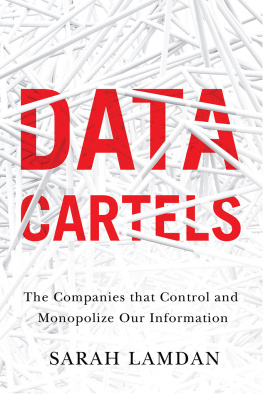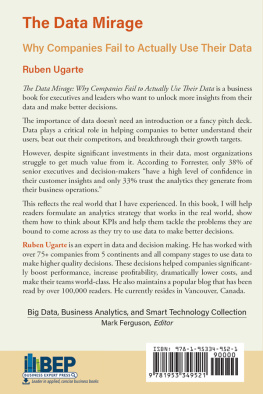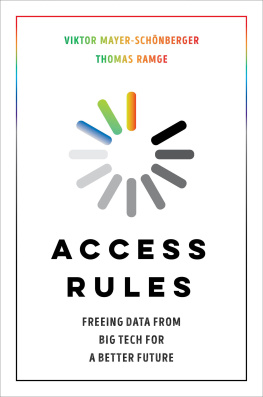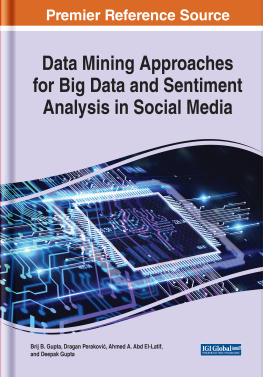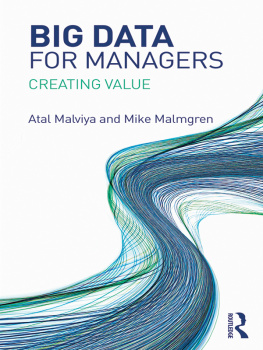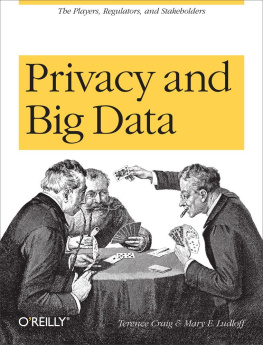DATA CARTELS
The Companies That Control and Monopolize Our Information
Sarah Lamdan
STANFORD UNIVERSITY PRESS
Stanford, California
Stanford University Press
Stanford, California
2023 by the Board of Trustees of the Leland Stanford Junior University. All rights reserved.
No part of this book may be reproduced or transmitted in any form or by any means, electronic or mechanical, including photocopying and recording, or in any information storage or retrieval system without the prior written permission of Stanford University Press.
Printed in the United States of America on acid-free, archival-quality paper
Library of Congress Cataloging-in-Publication Data
Names: Lamdan, Sarah, author.
Title: Data cartels : the companies that control and monopolize our information / Sarah Lamdan.
Description: Stanford, California : Stanford University Press, 2022. | Includes index.
Identifiers: LCCN 2022010953 (print) | LCCN 2022010954 (ebook) | ISBN 9781503615076 (cloth) | ISBN 9781503633711 (paperback) | ISBN 9781503633728 (ebook)
Subjects: LCSH: Information services industryLaw and legislationUnited States. | Information services industrySocial aspectsUnited States. | CartelsUnited States. | Antitrust lawUnited States. | Data protectionLaw and legislationUnited States. | Freedom of informationUnited States.
Classification: LCC KF2848 .L35 2022 (print) | LCC KF2848 (ebook) | DDC 343.7309/99dc23/eng/20220520
LC record available at https://lccn.loc.gov/2022010953
LC ebook record available at https://lccn.loc.gov/2022010954
Cover design: David Drummond
Cover image: Optimarc/Shutterstock
Typeset by Elliott Beard in Adobe Garamond Pro 11/15
For library workers everywhere
CONTENTS
PREFACE
I GOT INTO STUDYING DATA ANALYTICS companies by accident. Im a law professor, and for over a decade, I was also a law librarian who worked at law schools and law firms. That means Ive spent a lot of time using Lexis (RELXs legal information platform) and Thomson Reuterss Westlaw, the gold standard research products for the legal profession. In my role as a librarian, I spent so much time training students, and my colleagues, about how to use these products that some days I felt like little more than a glorified product rep for their parent companies, RELX and Thomson Reuters.
In 2017, someone sent me a news article reporting that another division within RELX called LexisNexis, and Thomson Reuters were vying to help the U.S. Immigration and Customs Enforcement (ICE) build its extreme vetting surveillance program.do surveillance work for the nations cruelest cops. Suddenly, the stacks of Lexis and Thomson Reuters books, records, and the Westlaw and Lexis printouts cluttering my office seemed unsavory.
Not only was the possible Westlaw-Lexis-ICE connection unsavory, using legal research products linked to ICE surveillance could run counter to ethical convictions held by both librarians and lawyers. Both professions prize confidentiality, and they protect people from unwarranted government intrusion. If Lexis and Thomson Reuters were working for ICE, it would raise uncomfortable questions: Was I training immigration lawyers to use products that help ICE arrest their clients? Were people who used my library giving their data to ICE?
My concerns intensified when I tried to discuss the issue with the companies. I wondered how, as a profession, wed failed to notice that Westlaw and Lexiss companies were also building surveillance products for police and ICE agents, so I asked my schools Lexis and Westlaw representatives about what their companies were doing with ICE. The companies product reps were usually helpful and eager to assist, so I expected prompt, reassuring responses. I was accustomed to the companies lavishing us with gifts and attention. When I was in law school, I got points for using Westlaw, which I eventually turned in for a designer handbag and silver watch. The companies even hired attorneys who were available 24/7 to answer our research questions by phone or online chat. I knew them as benevolent, generous entities that wanted to please their customers.
Surely this is a misunderstanding, I thought, hoping the people who worked at Westlaw and Lexis could clear up the issue with an easy explanation. I wanted to find peace of mind with companies that Id trusted, and that I relied on for so much of my job. But when I brought my concerns up directly with vendors, they didnt do anything to assure me that our data was safe from being sold to ICE or law enforcement. They werent even willing to issue a promise to my law school that our personal data wouldnt end up in ICEs data systems.
RELX, especially, exerted its power. A Lexis representative started camping out at my law school, calling my work phone, and my boss, demanding that I speak to her manager. She also started monitoring me through my students, asking them to report back to her if I talked about The takedown was an aberration: librarians are not the type to censor. Theyre usually the ones fighting censorship. Spurred by this baffling takedown, I started digging for answers to my questions about the companies data businesses in earnest.
Ever since, Ive been trying to connect the hidden informational world of data analytics companies like RELX and Thomson Reuters. I wasnt trying to find proof that these companies were harming the publicI was actually trying to do the opposite. Learning that Westlaw and Lexiss corporate overlords were helping ICE track people and feeding problematic predictive policing systems with flows of personal data shattered my career. I couldnt, in good conscience, train hundreds of new lawyers to rely on companies that were selling their future clients data to police and ICE officers. Law enforcement data brokering conflicted with the confidentiality obligations and zealous advocacy responsibilities inherent in the immigration law and criminal defense work that most of my students go on to do. I kept hoping that Id find something that would prove the ICE story wrong.
But the more desperately I searched for information that would prove that I was mistaken, the more my research surpassed my worst suspicions. I uncovered a web of information and data analytics products that hurt people in multiple information markets. These companies were building policing products. They were also making risk products that help our landlords, bosses, insurers, and healthcare systems decide whether to give us care and services that we need. They were selling academic metrics, data analytics products that determine whether scholars will get tenure or grant funding using outdated, elitist, and discriminatory ratings systems. They were paywalling critical information, including law and science, so people who arent wealthy, or affiliated with wealthy institutions, cant get access.
With every information market I investigated, I found a different group of people uniquely oppressed by data analytics companies. Immigrants rights groups are fighting to get data analytics companies invasive personal data dossiers removed from ICEs digital surveillance programs. People of color are disproportionately made targets by predictive policing algorithms. Academic scholars research is trapped behind the companies paywalls, and their funding and tenure depend on the companies metrics. Pro se litigants, including prisoners, cant see the legal information thats relevant to their cases because its only available on the companies platforms. The best financial data is only accessible to people who can afford pricey data analytics products. Data analytics companies have even paywalled news resources from the public, making it so that people cant get critical updates on local and national emergencies.

